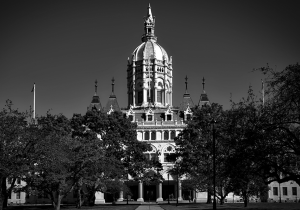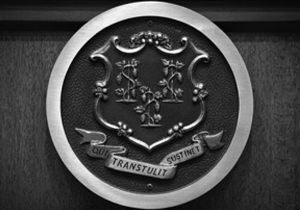February 25, 2019
Governor Lamont Unveils 2020-21 Budget Proposal
In his inaugural budget proposal, Governor Lamont relied heavily on a broad expansion of the sales tax base to currently exempt goods and services to spread the pain and balance the budget for fiscal years 2020-21. While the proposal does not increase the rates of the sales tax or income tax, or raid the $2.3 billion Rainy Day Fund, it faces stiff headwinds from those who view the sales tax as regressive.
Governor Lamont is proposing a budget totaling $21,218.1 million in FY 2020, an increase of 2 percent over the adopted FY 2019 budget. The total proposed budget for FY 2021 is $21,938.6 million, 3.4 percent above his recommendations for FY 2020.
The recommended budget is $900,000 below the spending cap for FY 2020 and $73.2 million below the cap for FY 2021, and is compliant with the revenue and volatility caps.
The projected state deficit in 2020 is $1.5 billion; in 2021 it is $2.2 billion.
How does Governor Lamont achieve a balanced budget? The centerpiece of his proposal expands the sales tax to previously exempt consumer goods and services, raising an estimated $292 million in 2020 and $505 million in 2021.
Following are some of the overarching features of Governor Lamont’s biennial budget proposal:
Revenues
• Extend the sales tax to such previously exempt items as legal, accounting, massage therapy, interior design, and real estate services; renovations and repairs of residential property; non-prescription drugs; waste collection, and digital downloads (e.g. Netflix).
• Reduce cap on Research and Development (R&D) and Urban & Industrial Site Reinvestment Act tax credits to 50% of the current cap.
• Limit carryforward of new R&D tax credits to 15 years.
• Restore highway tolls for all vehicles (Option One) or on trucks only (Option Two), on major Connecticut roadways.
• Freeze the diversion of sales tax on cars to the Special Transportation Fund.
• Levy a 1.5 cent/per oz. sales tax on sugar-sweetened beverages.
• Tax e-cigarette nicotine liquids at 75% tax of the wholesale price and raise the age for purchasing tobacco and vaping products to 21.
• Impose a 10-cent tax on plastic bags.
• Charge a 25-cent deposit on wine and liquor bottles, and a 5-cent deposit on nip bottles.
• Eliminate the state level gift tax.
• Extend deadline for filing estate tax from 6 to 9 months.
• Extend the $200 property tax credit to all filers.
• Eliminate $250 biennial business entity tax.
Spending
• Honor 2017 scheduled increases in ECS grants.
• Restructure COLA’s in State Employees’ Retirement Fund so that in years where fund investments do not meet their anticipated market performance, cost-of-living adjustments will be limited to no more than one percent, in years where investment performance exceeds expectations that limit is increased to three percent and the limit is increased to five percent when the fund exceeds its targets by more than three percent.
• Streamline State Employee and Retiree Healthcare benefits, including setting a maximum price the state health plan will pay for hospitals and physicians based on a percentage above the Medicare rate, among other things. NOTE: The State Employees Bargaining Agent Coalition (SEBAC) has issued a statement that they will not be asking their employees to make more sacrifices beyond what they have negotiated over the last decade.
• Require local school districts, excluding distressed municipalities, to contribute at least 25-percent of their normal Teacher Retirement System (TRS) costs.
• Re-amortize TRS unfunded liability over 30-years, and reduce assumed rate-of-return from 8-percent to 6.9-percent.
• Expand Minimum Budget Requirement to all school districts that realize savings from shared service arrangements and for school consolidation.
• Level fund arts and culture line items within the Department of Economic and Community Development.
Debt
• Reduce annual General Obligation bond authorizations by 39.5 percent.
• Reduce Special Transportation Obligation bond authorizations by 1.3 percent.
• Maintain municipal aid for school construction, LoCIP, Town Aid Road and municipal projects.
Miscellaneous
In his remarks before the General Assembly, the Governor also urged:
• Support for enactment of Paid Family and Medical Leave, (i.e. providing up to a $1,000/week for 12 weeks of leave to be finance with estimated employee payroll contribution of 0.5%).
• A phased-in increase in the minimum wage to $15/hour over four years, effective 1/1/2020.
• Continued discussions regarding legalization of marijuana and sports betting.
• Businesses to help spur economic development and create and retain jobs by emulating recent initiatives undertaken at Travelers and Stanley Black and Decker that help students repay their college loans and begin saving for the future.
Finally, the Governor’s proposed budget will now be subject to the legislative public hearing and deliberation process in the Appropriations and Finance Committees. Typically, the committees will vote out a revised budget-tax package in late April, at which time negotiations begin in earnest between legislative leaders and the administration. New consensus revenue estimates will be produced by the Office of Fiscal Analysis and the Office of Policy and Management at the end of April which could alter the budget discussion.
We will provide more details regarding the budget as they become available and public hearings are scheduled. In the meantime, if you have any questions please don’t hesitate to contact us.


